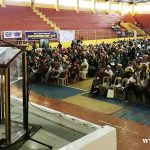TRADITIONAL yet never been antiquated. For the women of Devilla Comprehensive Agrarian Reform Program (CARP) Beneficiaries and Farmers Association, hand weaving is one inherited customary skill from their kinfolks. Bare handed, they make best use of the 1969 improvised wooden stripper to sliver buri leaves.
The group of weavers started as a cooperative in 1993 and eventually ceased their operationsin 2010. Through the assistance of the Department of Agrarian Reform (DAR), the association was reorganized in 2016 and was registered as farm workers under the Department of Labor and Employment (DOLE). The entrepreneurial experience that failed them once, became their inspiration to rise and dream again of becoming successful in the buri weaving industry. A series of skills training were conducted to enhance the skills of the weavers.

Under the Comprehensive Agrarian Reform Program of the Department of Trade and Industry (DTI), the the local weavers becameentrepreneurs as well. They became the cooperator of the Handicraft Production Shared Service Facility (SSF). Since then, the production of buri handicraft was enhanced. The laborious process was minimized then, with the help of the SSF equipment. The ordinary buri mats were improved into high end bags, utility tray, and other burihandicrafts.
By participating to DTI’s various local and national trade fair activities, buri handicraft products were show-cased with pride. These events became the venue for Devilla CARP Beneficiaries and Farmers Association to achieve market link with buyers and investors. Evidently, the association is now exporting tons of braided buri strips to China. The association is also an exclusive manufacturer of Pets’ Toy for Planet Pleasure in Los Angeles California.
Enriched burihandicraft tradition is now benefiting 75 home-based workers, with majority of its workers composing of women. The buri handicraft project provided sales income of 2.061M to its members, part time workers, and supplier of raw materials from the other 10 barangays in Sta. Cruz Municipality. These barangays include Banogbog, Baguidbirin, Masalukot, Napo, Haguimit, Jolo, Ipil, Botilao, Tambangan and San Isidro.
Aside from the marginalized farmers and women sector, the association has also supported the Persons Deprived of Liberty of the Marinduque Provincial Jail in improving their lives. The selected inmates were trained in utilizing the buri midrib trash from Devilla. This capacity expansion program was implemented to promote the advocacy of green practice. BuriMidrib trash from stripping buri was turned into elegant chairs such as the famous “Hongkong Peacock.” One talented inmate unselfishly shared his skill in making this product to make their spare time productive while earning source of living for their family members outside of the holding facility.
This is in support of the government’s their drive to reduce the effects of global warming. The association initiated the implementation of the green practices waste reduction. Through this simple way of waste reduction and recycling, they hope to contribute in eliminating waste thus creating a clean and green environment.
Devilla Comprehensive Agrarian Reform Program (CARP) Beneficiaries and Farmers Associationforms an integral part in their community, as they contribute significantly not only to the economic side of things, but to culture, heritage, and societal development as well.









Comments are closed.